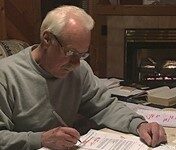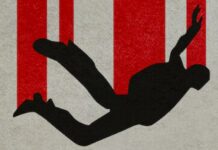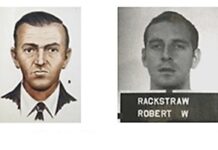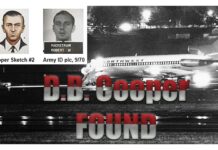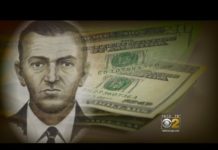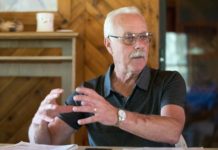The Oregonian
By Douglas Perry; Wednesday, July 10, 2019
Robert Rackstraw loved adventure. He also embraced danger and confrontation. And for a time, the FBI suspected him of being the legendary skyjacker known as D.B. Cooper.
Rackstraw died Tuesday in San Diego of natural causes. He was 75. He is survived by his wife Dorothy and “several children and grandchildren,” the San Diego Union-Tribune reports.
Born in Ohio in 1943, the high-school dropout became a decorated U.S. Army paratrooper during the Vietnam War in the late 1960s before being run out of the military for lying and other misconduct. He pursued various jobs and diversions in the years that followed, leading to trouble with the law.
He was acquitted in 1978 of murdering his stepfather. Soon after the acquittal, facing other charges, he faked his death and disappeared. He ultimately would be found and convicted of grand theft and passing bad checks. He spent almost two years in prison.
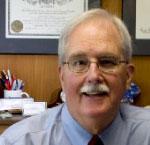
The prosecutor in the theft-and-forgery case, San Joaquin, Calif., deputy DA Clark Sueyres (Left), called him “a helluva con man. You’d buy a used car from him every time.” A few years ago, Sueyres gave an updated opinion: “I have dealt with a number of clever sociopaths in court, but [Rackstraw] has more smarts and nerve than the rest put together.”
Along with his exploits in California, Rackstraw also spent time in Oregon — beyond the possibility that he purchased a plane ticket at Portland International Airport on Nov. 24, 1971, under the name Dan Cooper.
Robert “Pudgy” Hunt, a celebrated Oregon high-school basketball player and long-time Portland tavern owner, worked in the flooring business with Rackstraw in the 1970s.
Hunt agreed with the California prosecutor that Rackstraw had charisma to burn. And that he couldn’t be trusted. “He had a criminal mind,” Hunt told The Oregonian earlier this year.
Hunt’s brother, he said, witnessed Rackstraw savagely beat a union worker who gave him some back-talk on a job site. Hunt later heard from another first-hand source that in California, Rackstraw stole a truck and smashed it through the front doors of a gun shop before driving off with a cache of weapons.
“He did [stuff] like that all the time,” Hunt said.
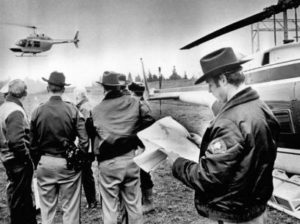
It might have been inevitable, then, that Rackstraw would be linked to the famous — and famously unsolved — D.B. Cooper case. In the late 1970s, the FBI considered Rackstraw a suspect for a while before moving on, in part because witnesses said the skyjacker was in his 40s. (Rackstraw was 28 in 1971).
A reporter at the time asked Rackstraw if he were Cooper, and the Vietnam War vet gave a cryptic answer, saying that if he were investigating the case, “I wouldn’t discount myself.”
In 2018, he gave a definitive answer for the first time to a reporter at the Courthouse News Service. When asked to confirm or deny it, Rackstraw stated, “There’s no denial whatsoever, my dear.”
Investigative journalist and documentary filmmaker Thomas Colbert became convinced that Rackstraw was indeed the skyjacker. In an effort to prove Rackstraw pulled off the crime, Colbert put together a 40-member team, led by former FBI agents. They came up with a raft of circumstantial evidence, some of which was very compelling.
The investigative team even reached the conclusion that Rackstraw was a mysterious grifter who alighted in Astoria in the early 1970s, passing himself off to a dozen residents as Swiss nobleman “le Baron Norman de Winter” — a name perhaps inspired by a character in Alexandre Dumas’ 19th-century novel “The Three Musketeers.”
Colbert wrote a 2016 book about Rackstraw, “The Last Master Outlaw.” He also produced a History Channel documentary about his investigation, “D.B. Cooper: Case Closed?”
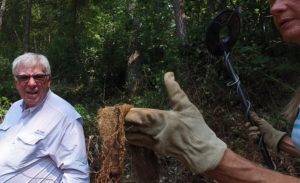
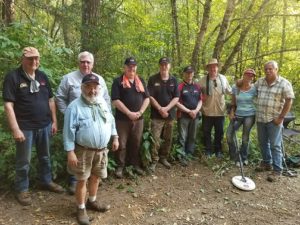
The FBI took little interest in the clues Colbert and his team had chased down, including the alleged parachute burial site (Above – with a gazing retired FBI supervisor and the forensic team).
But when agents went silent after delivering five dug-up materials, it led the organizer to conclude that the federal agency was abashed that a group of independent investigators may have solved the crime.
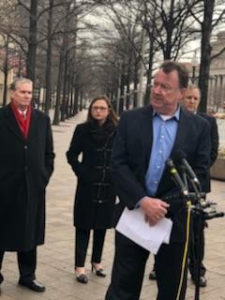
“It’s not that they’re concerned about a circumstantial case,” Colbert told The Oregonian last year (Left – with team members at FBI Headquarters). “This is obviously about embarrassment and shame.”
The FBI closed the D.B. Cooper case without resolution in 2016. Colbert, three years later, now has done the same.
“While my cold-case team absolutely believes he was Cooper, he also was a husband, father, grandfather and great-grandfather,” he said Tuesday in an email. “Our condolences to the family.”



